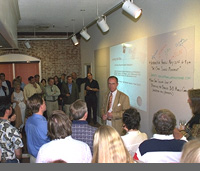| |
eProcurement and the Future of Internet Trading Communities/Online
Exchanges
Wednesday, May 10, 2000
6:00 - 8:00 p.m.
$10.00 fee (Pay at day of event, cash or check. No fee to Sponsors.)
Limit: 60 participants
Moderator
- George Sidman, Founder & President, Monterey Network Center
Panel of Experts
- Mr. Kenneth Campbell, CEO, Centegy Corporation
- Mr. Bob Jewell, President, PFN, Inc. (Formerly Thundercloud
Networks)
- Mr. Mark E. Palmer, Executive Vice President, Business and Legal
Affairs,NextSet Software, Inc
- Dr. Cosimo Spera, CEO, Saltare.com
Description
Competitors and technology are moving quickly and business rules
are being thrown out. The winners will be companies that understand
and take advantage of the rapid shifts in market conditions. Online
exchanges, also known as trading communities, are a B2B approach
that is being adopted at an astounding rate. These trading communities
aim to deliver on needs of both buyers and sellers. Ultimately,
they provide a platform to collapse the entire supply chain from
a linear model that is slow and rigid to a collaborative model that
can handle realtime information sharing.
By joining trading communities, buyers can expect to streamline
theprocurement process, gain access to new market opportunities,
and reduce transaction costs. Suppliers can expect to increase revenues
by expanding outside of their traditional channels and offloading
excess and obsolete inventories. The realtime information exchange
lets buyers and sellers reduce time and country or regional barriers.
In many instances, trading communities also enable a more level
playing field for smaller buyers and suppliers. However, online
exchanges are more relevant to some industries than others.
Joining a trading exchange can be as simple as accessing membership
through a Portal service. Yet, these very thin exchanges do not
provide all the benefits of a fully developed dynamic trading community
that encompasses every element of the supply chain process, from
buying and selling and transaction clearance to inventory visibility
and logistics. Basically, trading exchanges fall into two business
models. The first is the private trading community. The private
trading community is centered around a specific manufacturer and
enables customers, suppliers, logistics companies and the manufacturer
to share critical information about demand and inventory in a defined
supply chain. The second model is known as a hosted or public exchange.
There are many different types of hosted exchanges depending on
the complexity of the buying and selling relationships as well as
the depth of technology supporting them..
Our panel of experts will discuss these and many other challenges
and opportunities in the area of online exchanges/trading communities:
- What is the future of these online exchanges/trading communities?
- To take advantage of these trading communities, what challenges
do companies face?
- How do companies evaluate private versus private online exchanges
and their benefits?
- How do companies maximize the value of their information flow
within an organization?
- What technologies/solutions are available and how do companies
choose an internal eInfrastructure to maximise the benefits of joining
a trading community?
- What are the costs?
- What process does a company need to go through to join a dynamic
trading community?
top |
